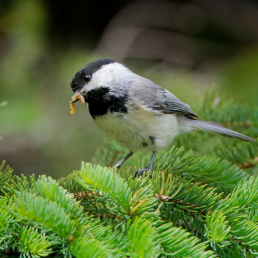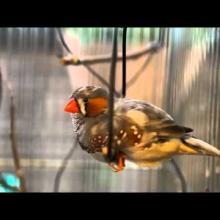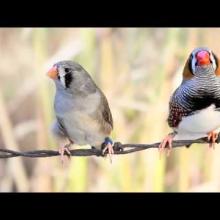

Join BirdNote tomorrow, November 30th!
Illustrator David Sibley and actor H. Jon Benjamin will face off in the bird illustration battle of the century during BirdNote's Year-end Celebration and Auction!
Songbirds delight us with their music, but at times they might sound repetitive. That’s because songbirds have to practice their singing to keep performing at their best. Researchers studying Zebra Finches found that females preferred the songs of males that had been practicing consistently compared to males that had taken a break from singing for a few days. So it seems that birds must keep their vocal muscles in shape to make sure everyone hears them loud and clear.
BirdNote®
Even Songbirds Have to Practice
Written by Conor Gearin
This is BirdNote.
[Red-eyed Vireo song, ML168303]
Songbirds delight us with their music, but at times they might sound repetitive. If you’ve ever heard a student rehearsing the same bit of music over and over again, you know the feeling.
[A# Major scale being played badly on a trumpet]
That similarity isn’t a coincidence. Scientists showed that even songbirds have to practice their singing to keep performing at their best.
[Zebra Finch song 1]
Researchers studied birds called Zebra Finches. They kept several male finches in the dark for a week to discourage them from singing.
[Sound of lights being shut off]
Without the cue of bright light, the birds stayed quiet, and their vocal muscles weakened.
Then, the lights came back on and the finches could sing again.
[Sound of lights being turned on]
The researchers recorded the finches singing after their break from practicing, and compared those songs to ones recorded before the experiment.
[Zebra Finch song 2]
They found that female Zebra Finches preferred recordings of songs from before the males took a hiatus from practicing. Even after a few days off, females could tell the difference.
So it seems one reason that birds repeat their songs is to keep their vocal muscles in shape. And of course, to make sure everyone hears them loud and clear.
[Red-eyed Vireo song, ML168303]
For BirdNote, I’m Michael Stein.
###
Senior Producer: Mark Bramhill
Producer: Sam Johnson
Managing Editor: Jazzi Johnson
Content Director: Jonese Franklin
Bird sounds provided by The Macaulay Library of Natural Sounds at the Cornell Lab of Ornithology, Ithaca, New York. Red-eye vireo song ML168303 recorded by Wil Hershberger. Zebra finch songs recorded by Iris Adams et al for Nature Communications.
BirdNote’s theme was composed and played by Nancy Rumbel and John Kessler.
© 2024 BirdNote December 2024
Narrator: Michael Stein
ID# song-22-2024-12-23 song-22
Reference:
The research article in Nature Communications: Daily vocal exercise is necessary for peak performance singing in a songbird
https://www.nature.com/articles/s41467-023-43592-6#Sec27
Daily singing workout keeps songbird males attractive
https://www.sdu.dk/en/om_sdu/fakulteterne/naturvidenskab/nyheder-2023/songbird-exercise






